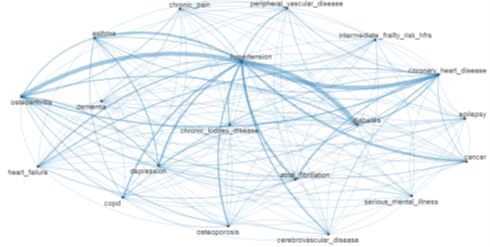With at least a quarter of the UK population living with more than one long term condition, the Multimorbidity Expert Reference Group wanted to increase understanding of multimorbidity and its impact on the NHS.
Arden & GEM’s Advanced Analytics Unit used the national segmentation dataset to deliver rich insight into the prevalence, range and cost of multimorbidity within the population.
The challenge
At least a quarter of the UK population is living with more than one long term condition, known as multimorbidity. Care for this group of patients is often complex (due to the interactions of conditions), fragmented and condition specific rather than individualised.
The Multimorbidity Expert Reference Group (MMERG) brings together clinicians, academics, statisticians, data leaders and economists to develop an evidence base for the prevention and management of multiple long term conditions, in order to improve outcomes and experiences of care. As part of this ambition, MMERG wanted to increase understanding of multimorbidity and its impact on the NHS.
Our solution
Arden & GEM’s Advanced Analytics Unit worked as part of a steering group with NHS England and Outcomes Based Healthcare to design a four-phase research and analysis programme comprising:
- Phase 1: Understanding the issue and raising awareness of multimorbidities and their impact on patients
- Phase 2: Describing the impact of multimorbidity on the health system
- Phase 3: Evaluating the impact of lifestyle interventions on multimorbidities
- Phase 4: Providing recommendations about the opportunities to manage multimorbidities.
Phase 1 of the programme has now been delivered by Arden & GEM, providing a wealth of analytical insight for the NHS.
Our analysts used the national segmentation dataset, which is hosted within the National Commissioning Data Repository (NCDR) and includes a registry for 43 conditions, as the basis for their investigation. Through proactive engagement with the Expert Reference Group, the team ensured that the insight provided would be useful for policy and practice responses to multimorbidity. By using a range of programming and analytical techniques, combined with healthcare knowledge, the team was able to work with the large dataset to undertake the first phase of analysis quickly and effectively.
Analytical outputs
Long term conditions
Our analysts explored the prevalence of individual long term conditions at a population level, broken down by age, sex, ethnicity and deprivation levels, with an accompanying narrative highlighting key points. Average acute cost and contacts were also mapped by condition to identify potential impact opportunities.
Longitudinal analysis
Our analysts considered the longitudinal implications for the segmentation dataset including a comparison, by condition, with QOF data to provide a benchmark against primary care. Indexing prevalence to a base financial year enabled the rate of increase to be observed across the two datasets.
Multiple long term conditions
We examined the prevalence, range and cost of multimorbidity in the population with a focus on age and deprivation. Commonly occurring co-morbidities and their risk ratios were explored before detailing their resultant levels of care activity.

The benefits
- The first phase of analysis has brought a rich level of insight into long term conditions, multimorbidity and prevalence levels within the population
- Visualisation expertise and application has helped the client to better understand risk ratios, cost and acute activity
- The dataset has been updated to include National Diabetes Audit data which will further enrich future analyses and phase 2 of the programme
- Subsequent phases will now be able to drill down into opportunities for and the potential impact of intervention for particular conditions, with an initial focus on diabetes.
"Multimorbidity, an entity otherwise known as Multiple Long-Term Conditions, is increasing in prevalence across the country and is a highly complex area of medicine. The Arden & GEM Advanced Analytics team have brought some truly innovative thinking to the application of data to drive improvements in health service delivery for the benefit of our patient populations with Multiple Long-Term Conditions. The team have also been a pleasure to work with.”
Jonathan Valabhji, National Clinical Director for Diabetes and Obesity at NHS England and Chair of the Multimorbidity Expert Reference Group
